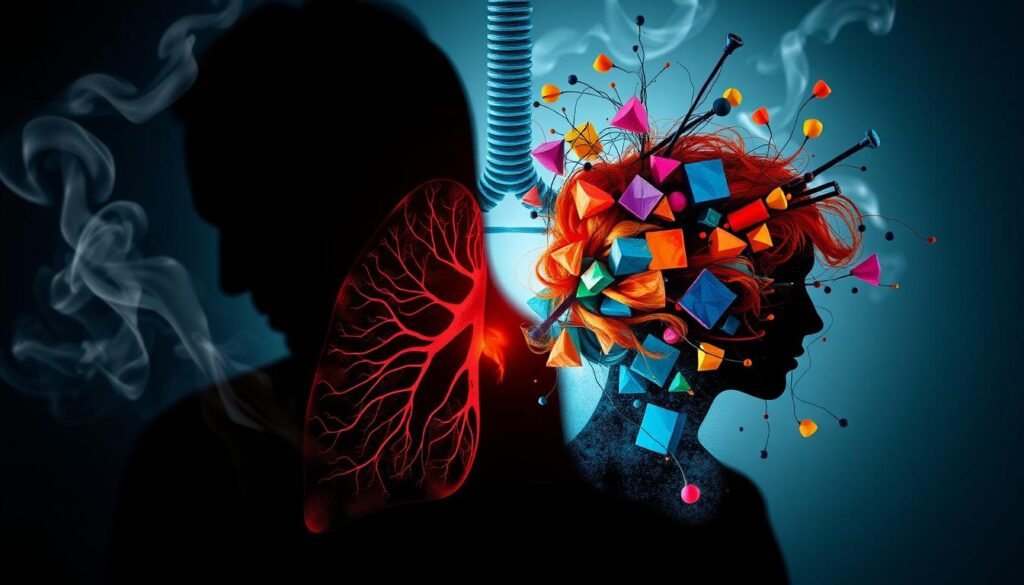About 60% of those with lung cancer face mental health issues like anxiety and depression. This fact shows the deep connection between lung cancer and its emotional effects. Discovering one has lung cancer can deeply affect their mood and life quality.
Understanding how this impacts wellbeing is vital. Emotional distress can lead to skipping treatment and worse health. More than 13% of women develop major depressive disorder after finding out they have lung cancer. This shows the need for care that looks after both the body and the mind.
Key Takeaways
- Nearly 60% of lung cancer patients suffer from mental health distress.
- Depression can severely affect treatment adherence and overall quality of life.
- Over 13% of women with lung cancer are diagnosed with major depressive disorder.
- Individuals under 55 are at a higher risk for developing major depressive disorder post-diagnosis.
- A significant gap exists in the provision of mental health care, with only 10% of patients referred for psychological support.
The Connection Between Lung Cancer and Mental Health
Lung cancer affects not just the body but also the mind. Those facing this illness often experience anxiety and depression. These feelings can make life much harder for them. The fear and uncertainty that come with lung cancer can lead to serious mental health problems.
The Emotional Toll of a Lung Cancer Diagnosis
Getting told you have lung cancer brings a flood of emotions. Patients struggle with these intense emotions. Even after the initial shock, the emotional weight remains, causing high levels of distress. Surveys show about 43.4% of patients feel this heavy emotional burden. It can impact everything from their mood to their physical health.
Statistics on Mental Health Conditions in Lung Cancer Patients
Numbers show worrying trends in the mental health of those with lung cancer. One in eight might develop major depressive disorder (MDD). The issue is more common in women and the young. Moreover, 33-44% report depression, which hurts their care and health outcomes.
| Mental Health Condition | Prevalence (%) |
|---|---|
| Major Depressive Disorder (MDD) | 12.5 |
| Depression (overall) | 33-44 |
| Psychological Distress | 43.4 |
| Anxiety | Variable |
Understanding Psychological Distress in Lung Cancer Patients
Lung cancer affects both physical and mental health. Patients often feel anxious and depressed. It’s vital to understand these issues for better care.
Common Symptoms of Depression and Anxiety
Lung cancer patients may face many psychological symptoms. Signs of depression include mood swings, lack of joy, fatigue, and suicidal thoughts. Stress from cancer treatment and chronic pain plays a big role.
About 49% of patients feel more anxious, while 41% show depression signs. Consequently, 51% undergo severe distress.
Why Lung Cancer Patients Are More Vulnerable
Lung cancer patients deal with unique challenges. The disease’s physical symptoms and tough treatments add psychological stress. Experiencing stigma worsens their mental distress.
This leads to poorer life quality. A cycle of anxiety and depression reduces mental and physical health. Hence, tailored support is crucial.
Supporting these patients is key. Integrative care, including palliative and radiation therapy, tackles cancer’s psychological effects. To learn more about treatment and life quality, see this resource.
Lung Cancer and Mental Effects: A Dual Challenge
Lung cancer affects both physical and mental health deeply. It demands a care approach that considers both sides. If we ignore one, it could hurt the other. Many who face this illness also deal with distress, affecting their overall condition.
This makes it vital to integrate care strategies. Such an approach boosts survival chances and treatment success.
The Interaction Between Physical and Mental Health
Lung cancer can take a toll on mental well-being. Symptoms and the fear of death stir up anxiety and depression. Studies show these mental struggles can lead to drastic outcomes like higher suicide rates.
Those with lung cancer are at a greater risk of suicide than others. Treatments need to tackle both the body and the mind. This involves therapies for both physical symptoms and psychological impacts.
How Treatments Can Affect Mental Wellbeing
Chemotherapy and similar treatments have side effects. These can include fatigue, pain, and even changes in thinking. Such effects often worsen a person’s mood.
Getting mental health support during this time helps lessen the strain. A study has found that mental care leads to better cancer fight outcomes. Plus, those with existing mental health issues fare better with strong social support.

Focusing on both physical and mental health in lung cancer care boosts life quality. Techniques like cognitive-behavioral therapy (CBT) have been effective in easing psychological symptoms. It is essential to keep focusing on comprehensive care for the best outcomes.
Check out this resource for more on depression and lung cancer.
Impact of Emotional Distress on Treatment Outcomes
Emotional distress can greatly impact the outcomes of lung cancer treatment. It affects how well patients can stick to their treatment plans. Those with high emotional distress find it harder to follow doctor’s orders. This can lead to longer hospital stays and more medical bills. It’s important to help patients deal with emotional issues for better care and healing.
The Link Between Mental Health and Treatment Adherence
Mental health and sticking to medical treatments are closely linked. Patients struggling with anxiety and depression find it tough to follow their treatment schedules. If they don’t adhere to treatments, their health could worsen. However, improving mental health can make it easier for them to follow medical advice. This leads to better health and longer life. A study showed that focusing on emotional health can improve treatment success [read more].
Effects on Quality of Life and Prognosis
Emotional distress doesn’t just affect treatment adherence; it also impacts life quality and recovery prospects. Mental health issues can lower a patient’s quality of life, which is key for getting better. Higher life quality comes from things like feeling spiritually fulfilled, being active, and having fewer symptoms. People who take care of their mental health live longer. This shows the importance of focusing on emotional well-being. For example, cancer patients who improved their mental health also saw better life quality. This led to them sticking to their treatments more, which helped their recovery.
| Study Findings | Impact on Treatment Outcomes |
|---|---|
| High levels of emotional distress | Lower adherence to treatment plans |
| Improved mental health | Higher treatment compliance |
| Engagement in supportive therapies | Enhanced quality of life |
| Effective symptom management | Increased survival rates |

Coping Strategies for Patients and Caregivers
Dealing with lung cancer brings both patients and caregivers tough challenges. Having the right coping strategies helps a lot. These methods can lessen feelings of anxiety and depression, improving overall wellness.
Techniques for Managing Anxiety and Depression
If you’re dealing with lung cancer, there are ways to manage anxiety and depression. Techniques like mindfulness, meditation, and staying active reduce stress. Getting professional help through approaches like CBT and IPT offers strong support.
Finding emotional support is key. Many find talking with family, friends, or in support groups helps their wellbeing a lot.
Importance of Support Networks
Support networks are very important for lung cancer patients and their caregivers. They help lessen feelings of being alone. By sharing experiences and feelings, both patients and caregivers benefit.
The help from friends and family eases the load on caregivers, who often feel stressed. Making strong connections builds resilience. This leads to better emotional health for patients and caregivers.

Role of Healthcare Professionals in Mental Health Support
Healthcare workers are key to helping lung cancer patients with their mental health. They look after both the body and the mind. This care boosts patient results.
They use regular checks to spot and tackle mental health needs. A good care plan targets treatment for each person. It watches mental health over time.
Creating a Comprehensive Care Plan
Care plans bring together doctors, nurses, and mental health experts. This teamwork improves how well they communicate. It makes sure help is given quickly based on what patients say.
These plans help teams support patients’ mental health. This is vital early on after finding out about cancer. Around 25% of patients might need mental health care in their first year.
Encouraging Open Conversations About Mental Wellbeing
It’s important for patients to talk freely with their healthcare team about mental health. Many are scared to bring up their emotional struggles. Making a safe space for these talks helps them open up.
Quickly dealing with these issues means patients can get the right help sooner. This improves their care experience.
Resources for Mental Health Support
It’s important for anyone dealing with lung cancer to have access to mental health resources. These resources offer crucial support during tough times. Various organizations provide specific help for cancer patients and their families.
Support Groups and Advocacy Organizations
Support groups play an important role for those facing lung cancer. CancerCare, the Cancer Support Community, and the Cancer Survivors Network (CSN) offer free help. They provide peer support for patients, survivors, and caregivers.
These programs help people connect with others in the same situation. For those who can’t meet in person, online options offer flexibility and privacy.
Professional Mental Health Services Available
Seeking professional help is key for mental health issues linked to lung cancer. Specialists in oncology mental health can provide coping methods and therapeutic support. Organizations like the Anxiety and Depression Association of America and Mental Health America have lots of resources.
The National Suicide Prevention Lifeline is there for anyone in crisis. It’s a crucial service.
| Resource Type | Organization | Services Offered |
|---|---|---|
| Support Groups | CancerCare | Free peer support, online groups, and limited financial assistance. |
| Advocacy Organizations | National LGBT Cancer Network | Resources and online peer support for LGBTQ+ individuals. |
| Children’s Support | CancerCare’s Kids Talk | Support groups and digital library for kids impacted by cancer. |
| Veteran Services | U.S. Department of Veterans Affairs | Mental health services for veterans with cancer. |
Research on Mental Health and Lung Cancer
Current studies reveal a deep link between mental health and lung cancer care. It’s vital to care for both mental and physical health to improve patient well-being. This approach can boost treatment effectiveness and life quality for those with lung cancer.
Recent Studies and Their Findings
Research shows good results for veterans with mental health issues in treatment programs. Veterans in mental health treatment programs have a 26% lower risk of dying from any cause. This includes a 23% lower risk from lung cancer. Those getting help with housing and jobs see even bigger benefits, with up to a 30% lower risk of lung cancer death. Such support is key for better patient results.
Lung cancer is the leading cause of cancer death in the U.S. An estimated 234,580 new cases are expected in 2024. Despite this, lung cancer research gets less funding than other cancers.
Future Directions in Mental Health Research for Cancer Patients
Future work will focus on full care plans that include mental health support for lung cancer patients. Depression is common among these patients, affecting up to 65% of them. Addressing mental health will be crucial for improving care. Finding those at high risk early can lead to better treatment outcomes.
Upcoming research will also look at how lung cancer stigma affects mental health. This stigma can increase depression and anxiety. Understanding this can highlight the need for more lung cancer research funds.
| Program Type | Reduction in Overall Mortality Risk | Reduction in Lung Cancer Mortality Risk |
|---|---|---|
| Mental Health Treatment | 26% | 23% |
| Housing Support | 28% | 30% |
| Employment Support | 27% | 20% |
More research and development can greatly improve care for lung cancer patients. This includes vital mental health support throughout their care journey. For further insights on treatment side effects, you can find more information on taste changes during cancer treatment.
Learn more about managing taste changes during lung cancer treatment.
Conclusion
Lung cancer affects not just the body but the mind too. It has the highest death rate in the world. A shocking 92.8% of patients feel depressed and anxious. It’s key to care for their mental health as much as their physical health.
This care helps improve lives greatly. The sad truth is that many with lung cancer think about suicide. Yet, there’s hope when we link body and mind health care. We need strong support systems that include mental health services to make treatments work better.
Higher stages of the disease and surgery issues can make depression and anxiety worse. We need to deal with these through good support and the right treatments. This approach can help manage the emotional challenges of lung cancer.
To make emotional wellness better, we need good communication. This means talking well among doctors, patients, and their families. If we focus on mental health just as much as cancer care, we can offer better overall support. This can lead to better health outcomes and a better life for those fighting lung cancer.